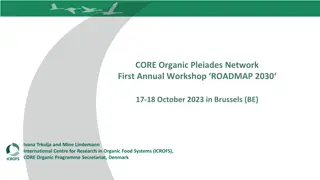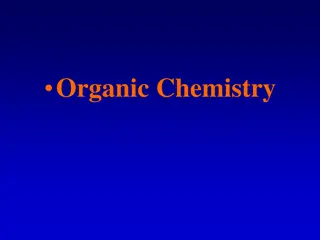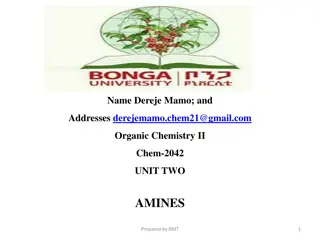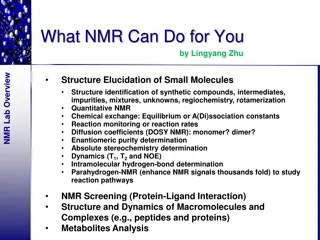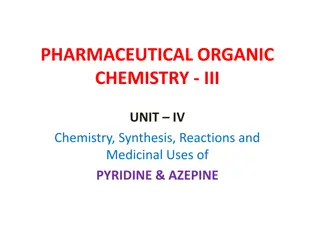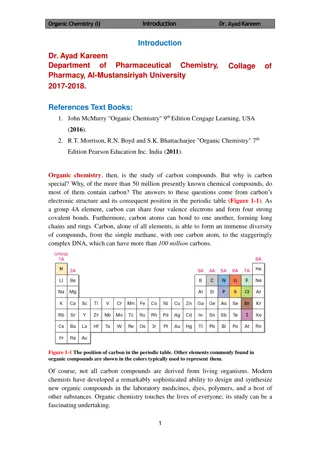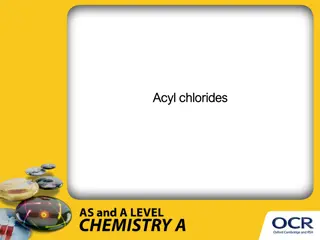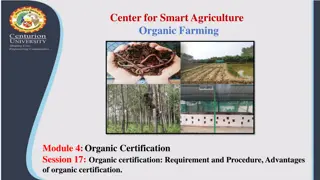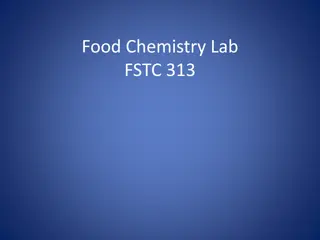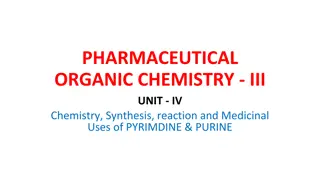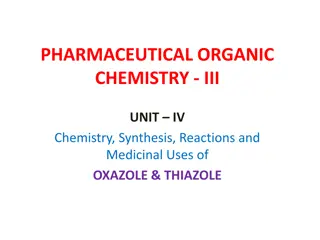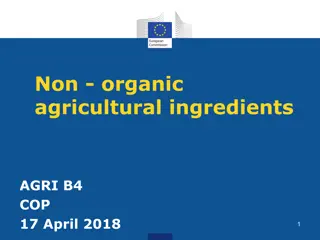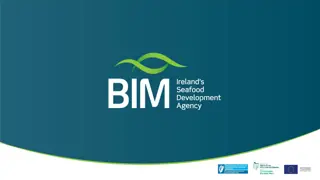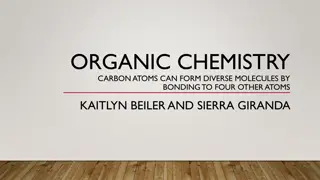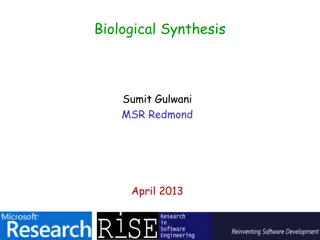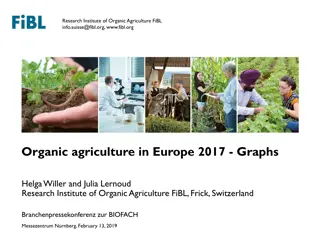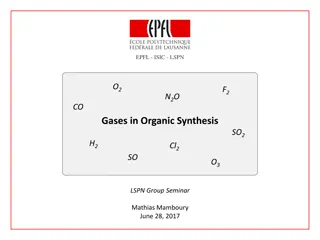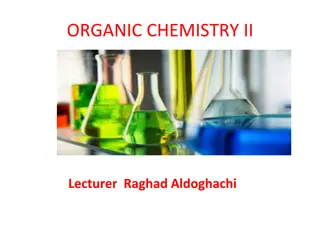Organic Chemistry Synthesis Lab Overview for Fall 2018
The post provides detailed information on the synthesis of 4,4-di-tert-butylbiphenyl through Friedel-Crafts Alkylation in Chemistry 318 for the Fall 2018 semester. It includes a schedule of the lab day, due dates for reports and assignments, grading criteria, pre-lab requirements, and emphasis on significant digits in lab reports and data citation. Students are reminded to follow instructions for lab reports and pay attention to separation schemes, theoretical yield calculations, and citing physical property data. The post also mentions ongoing experiments and upcoming tasks in the lab.
Uploaded on Sep 17, 2024 | 1 Views
Download Presentation

Please find below an Image/Link to download the presentation.
The content on the website is provided AS IS for your information and personal use only. It may not be sold, licensed, or shared on other websites without obtaining consent from the author. Download presentation by click this link. If you encounter any issues during the download, it is possible that the publisher has removed the file from their server.
E N D
Presentation Transcript
SYNTHESIS OF 4,4-DI-TERT- BUTYLBIPHENYL Friedel-Crafts Alkylation Chemistry 318 Fall 2018
Schedule of day PPE check at the door Pre-lab check at the door Quiz Recitation Nitration, part II Synthesis of 4,4 -di-tert-butylbiphenyl Safety Put bags away Goggles Gloves Lab Coat LAB!
Due Dates Today At beginning of lab Separation Scheme for Nitration of Methyl Benzoate Spectroscopy Problem Set (Part II, #2) at end of lab -- copy of laboratory notebook pages for today's experiment (continuation of Nitration and new Friedel-Crafts) Next Week At beginning of lab - Nitration of Methyl Benzoate Report Spectroscopy Problem Set (Part II, #3) Two Weeks Synthesis of 4,4 -di-t-Butylbiphenyl Report Spectroscopy Problem Set (Part II, #4,5)
Grading from last week Review the errors you made on the Bromination Report. Most likely, you will need to review significant digits; reaction mechanisms (not chemical equations) Notice that the graded parts correspond to the explicit instructions on BlackBoard and the Manual for writing this report. If you have questions about how it was graded, please ask. Quiz- if there is a Video assigned for an experiment, there will be quiz questions asked from it. Notebook be sure to include all categories required for the pre-lab (such as equipment/chemicals/glassware).
Synthesis Lab Reports Follow the instructions posted on Blackboard under Notebook & Report Formats . Synthesis labs require a Separation Scheme, which is a flowchart describing how the product was purified from the reaction mixture. See the example in Blackboard & the Lab Manual, 14- 16. Separation schemes represent the ideal situation and include all steps in the experimental procedure (whether completed in lab or not) and all possible impurities.
Synthesis Lab Reports Pay attention to significant digits (0.002 has only one significant digit). Note the example in the Lab Manual for calculating moles of strong acids such as H2SO4 and HNO3. Note the example for completing the table on the report form that is the calculation of the theoretical yield. Pay special attention to citing physical property data (M.W., density, etc.) as explained in the Citation section of the Lab Manual.
In Lab Today Finish the Nitration experiment Finish the Nitration experiment Weigh the final product: weigh empty vial, place product in vial, weigh again. Use a rolled paper funnel to transfer the solid to the vial. Take melting point melting point of product. Increase temperature slowly Range: from first drop of liquid to complete melting Take an IR using a thin film IR using a thin film (either acetone or dichloromethane). Properly label the vial containing the product. Submit the vial before the end of the period. Perform Perform Friedel Friedel- -Crafts Alkylation Expt. Crafts Alkylation Expt.
Friedel-Crafts Alkylation Today is our last example of SEAr! When an alkyl group, R, is substituted on the aromatic ring in the presence of a Lewis acid, the reaction is termed a Friedel-Crafts Alkylation. The experiment today involves the aromatic biphenyl (both rings are alkylated) and tert-butyl chloride. The catalyst (a mixture of aluminum chlorides) is formed in situ by the reaction between Al and t-BuCl. Alo (CH3)3CCl + HCl (CH3)3C C(CH3)3 2 + CH2Cl2 CH3 CH3 CH3 CH3 CH3 CH3 C C C Cl Al Al CH3 CH3 CH3 Cl Cl
Friedel-Crafts Alkylation The electrophile electrophile (t-butyl carbocation) is generated from t-BuCl and the AlR2Cl catalyst. (CH3)3C Cl AlR2Cl (CH3)3C Cl AlR2Cl (CH3)3CCl AlR2Cl The t-butyl carbocation reacts with the electrons in the aromatic ring to form the arenium ion. arenium ion. H H H resonance stabilized (CH3)3C H C(CH3)3 H H The electrophile enters the para position because the resulting resonance stabilization also includes the electrons of the other benzene ring (ortho attack is sterically hindered) + + Cl AlR2Cl AlR2Cl H C(CH3)3 + + H Cl C(CH3)3 + +
Friedel-Crafts Alkylation The arenium ion loses a proton (H+) to regenerate the ring aromaticity. The reaction by-product is HCl (gas). The AlR2Cl catalyst is regenerated. A second reaction then takes place on the other aromatic ring to give the final product.
Safety Safety Safety Dichloromethane (solvent) is a known carcinogen upon chronic exposure. Use caution and work in the hood when specified. Before beginning reflux: Check all seals and clamps on glassware. Make sure the top of the condenser is not sealed. Ensure the water flow goes IN at the bottom and OUT at the top. Have the instructor CHECK your apparatus before turning on the heat.
Experimental Notes Replace the funnel/beaker gas trap shown in the experiment with a drying tube filled with Neutrasorb (which will react with and absorb the evolved HCl gas). Blue Neutrasorb becomes white when it reacts with acid. The instructor must approve your reflux set-up before you begin heating your flask. Neutrasorb goes blue -> white when it reacts with HCl
Experimental Notes Use a long-stem glass funnel to deliver all liquids to the round-bottom reaction flask and sep funnel. Use a rolled paper funnel to transfer biphenyl to reaction flask. BEFORE lab: make sure you can calculate the mass of biphenyl needed for the reaction to maintain the stoichiometric ratio. BEFORE lab: make sure you know which layer in separatory funnel (aqueous or organic) contains your product and know which layer is top/bottom (check densities).
Experimental Notes Add sanded aluminum pellet to reaction mixture through the top of reflux apparatus. Hot plate should be set no higher than 2. Record all color changes and time in your notebook. Wait for the reaction mixture to come to room temp. before transferring to sep. funnel. Review extraction with separatory funnel and drying agents in Morig assignment.
Experimental Notes NEVER throw anything out until you are sure you have your product isolated! Keep the organic extract in an Erlenmeyer flask (never a beaker). Always keep a beaker under the funnel in case of leaks.


